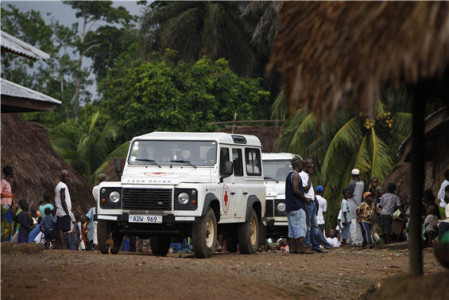 I felt compelled to share the message below from an Ebola hot zone.One of our readers, Abdul Rashid Mansaray, shared his story of operating an Internet Café in Sierra Leone. He highlights some of the challenges facing those who want to build a digital business in West Africa. In an area of the world already working to overcome barriers to entrepreneurialism, Ebola has made things harder.
I felt compelled to share the message below from an Ebola hot zone.One of our readers, Abdul Rashid Mansaray, shared his story of operating an Internet Café in Sierra Leone. He highlights some of the challenges facing those who want to build a digital business in West Africa. In an area of the world already working to overcome barriers to entrepreneurialism, Ebola has made things harder.Stories of change-makers in the field, whether of successes or failures, help others to follow in their footsteps. By understanding and anticipating challenges, one can more easily overcome them. My hope is for Abdul Rashid’s story to inspire and teach others in the region.
I am from Freetown, where Ebola has taken a toll on the lives of many of my people. As a nation, we are doing all we can in collaboration with international partners to bring this deadly epidemic to an end. As a nation, we are deeply concerned about this epidemic and we are taking precautions to protect ourselves from this virus.
I operated an Internet Café in Freetown for three years (2011 – 2014). In the early days of my business, patronage from customers was good. I think of myself as a social entrepreneur and I really enjoyed assisting people with various computer related services.
In 2012, the downward trend of my business started, few people were coming to the Internet Café as they could now access the internet through their mobile phones and other handheld devices.
Pressures to keep the business afloat were not easily dealt with. I was not making enough money to meet my financial obligations. I did all I could but to no avail. The business of operating an Internet Cafe in my community was no longer a profitable venture. The mobile phone operators started selling data packages and people felt mobile devices was a more convenient way to access the Internet.
The cost of running the business was going up while the patronage from customers was falling due to technological advancement.
For instance, the rent for the premises was Three Thousand Dollars ($ 3.000) per year. Electricity is not that constant in Freetown, I spent $400 monthly to maintain and fuel our power generator. The most painful part of my ordeal was the unreliable Internet, amounting to $280 per month.
Below is a run down of my monthly expenses:
Rent $250
Internet Subscription $280
Fuel & Maintenance $400
Allowance for part time staff $ 100
Miscellaneous (Office Stationary etc) $ 50
Total : $ 1,180
I wasn’t even making half of the $1,180 to cover my expenses. I decided to shut down the business in May to allow myself time to figure out a new Internet-related business.
This experience motivated me to seek out a sustainable business model that impacts my community and country at large. I heard about Impact Sourcing on BBC Radio. I’m truly inspired by what’s going on in this industry.
The state telecommunication company, Sierratel, continues to invest a lot into fibre optic infrastructure. Compared to three years ago, Internet speeds have gotten much better.
I am kindly pleading for solutions for my people, especially those who have lost their parents to Ebola. Internet-based jobs can bring hope back into my community. I want to run a sustainable operation that creates jobs and benefits young people.
My message to Abdul Rashid:
Lean startup principles can help you design and test a sustainable business operation. Based on your recent experiences, I don’t need to tell you that it will be essential to carefully invest money into your next business. I recommend using these principles to create value for the type of customers who are willing to pay you in return for the value you offer them. It seems like common sense, but actually executing something that meets this description takes a lot of work. Another tip: don’t fight the market. Internet cafés as you once knew them may not be profitable. Maybe call it something else? Take a different approach: require memberships and offer something additional that’s specific and easily understood. If you don’t like the idea of opening the doors to a new facility, you probably don’t need to! See what happens when you try to build a business without spending any money. Design a service and offer it for free. Test it with as many people as possible, adjusting it along the way. If you provide enough value, you’ll be able to turn these people into customers. People can make money online by using their mobile devices to fulfill crowdsourced microtasks. Maybe you can learn how to do that and gather people regularly to refine your operation. You could hold meetings in a facility that doesn’t require you to pay rent (i.e. a school or community center) to keep things professional.
I wish you all the luck in the world, but hopefully you won’t need it. Business leaders often create their own luck!
Looking for another forward-thinking story on Sierra Leone in Ebola’s aftermath? Check out this effort to support the youth of Sierra Leone. They need to feel empowered to express their thoughts on the Ebola epidemic and devise creative ways to prevent exposure to the virus.
